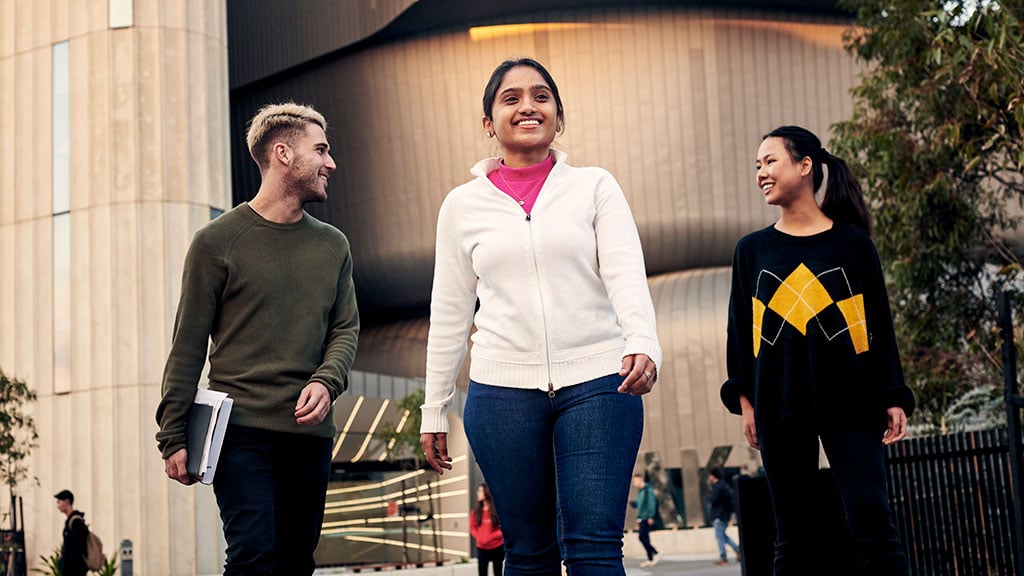What makes a ‘healthy’ relationship? Why respect is key – and the warning signs to look out for
It’s Sexual and Reproductive Health Week – and we’ve already highlighted how important it is to be informed and confident about practising safe sex, and busted some common myths about contraception.
But while the physical stuff is really important, so are the emotional aspects of relationships. And we’re not just talking about intimate partner relationships. A key part of your uni, work and everyday life involves interacting with a range of people – many of whom may be different to you.
These differences may be obvious – like someone’s skin colour, accent, physical ability or appearance. Other differences may be harder to see, and include sexuality, faith, citizenship status or childhood experiences.
At Deakin, we strongly believe in relationships that encourage you to speak up and share your ideas and perspectives. Being accepted and treated with respect helps you to thrive in all aspects of your life. But while meeting new people at uni is exciting, scary and often fabulous, it can also be complicated – and how can you tell if a new or existing relationship is good for you?
To help you navigate this tricky terrain, we asked Dr Lee FitzRoy, Coordinator, Sexual Harm Prevention, and Laura Burge, Manager, Respectful Behaviours from Deakin’s Diversity and Inclusion team, about the complexities of forming and sustaining healthy relationships.
How can I share respectful relationships with my partner, friends, family and colleagues?
Lee and Laura say that a good place to start is to acknowledge that what makes a healthy relationship is not the same for everyone. This is because we’re all diverse and value different things in our relationships – such as spending time together, how we show affection, how we communicate and how we share intimacy.
Our needs also change over time – what you want in a relationship when you’re 18 may be different to when you’re 25 or 40.
To check if a current relationship is ‘healthy’, ask yourself the following questions:
- Can I be myself with them?
- Do we communicate openly with each other, without fear of repercussion (such as getting the silent treatment or worrying that the relationship will end after an argument)?
- Do we resolve our disagreements in healthy ways?
- Do we trust each other?
- Are they supportive of your existing family, social circle and other relationships?
- Do you feel comfortable to spend time apart from each other?
- Is there laughter and joy when you’re together?
- Sex and physical intimacy is fun, comfortable and enjoyable for both.
How do I know if a relationship has become unhealthy?
A relationship can become ‘unhealthy’ when there is an unequal power balance, or if the other person says or does things that make you feel unworthy, unsafe or humiliated.
Watch out for the following ‘red flags’ for unhealthy relationships, where one person:
- is nervous about disagreeing with the other
- says hurtful things to or about the other
- is always checking on the other person’s movements and activities
- controls the other person’s contact with family and friends
- has set up all the social media and online bank accounts and passwords.
How can I develop more respectful relationships?
At Deakin, we’re committed to providing an environment where everyone feels included and respected for their unique perspectives and talents. To help you embed respect in all your relationships, Lee encourages you to try the following:
- Communicating and working courteously with everyone – from your friends and other students, lecturers and supervisors to librarians, cleaners and security guards.
- Complying with relevant laws, policies and procedures, which you’ll find in the Deakin Student Code of Conduct and Terms and Conditions of Enrolment.
- Completing our online Respectful Behaviour module, which provides important information on topics such as consent and gender equality. All commencing students are automatically enrolled in this module, which you’ll find in the units section of DeakinSync or your Cloud Deakin unit list.
- Taking advantage of free training on a range of topics, including LGBTQI+ awareness, responding to disclosures of sexual harm and bystander intervention. Just email [email protected] for more information.
- Completing the National Student Safety Survey by Sunday 3 October. We’ll use the results from this survey to guide future actions to support respectful behaviours and student safety.
I’m concerned about a relationship – where can I get help?
For immediate emergency help, call Victoria Police on Triple Zero (000) or Deakin Security on 1800 062 579 if you’re on campus. If you need to leave a violent situation, you can – regardless of any COVID-19 restrictions in place.
If you, or someone you know, feels scared, intimidated, fearful or generally concerned about a relationship, reach out to our Safer Community service. Safer Community provides support for cases of sexual harm, domestic and family violence or other instances of troubling behaviour – on or off campus.
You can also contact the following Deakin services:
- Counselling and Psychological Support
- Harassment and Discrimination Contact Officers
- Disability Resource Centre
- LGBTIQ network.
The following off-campus specialist services are available 24/7:
- 1800 RESPECT (1800 737 732) – sexual assault, and domestic and family violence counselling
- Lifeline (13 11 14) – crisis support and suicide prevention
- Beyond Blue (1300 224 636) – mental health support
- MensLine Australia (1300 78 99 78) – telephone and online counselling service for Australian men
- Victorian Sexual Assault Crisis Line (1800 806 292) – crisis response for people who have experienced sexual violence
- Safe Steps (1800 015 188) – crisis response for people who have experienced family violence.
I’d like more information about respectful relationships
The Respectful Behaviours team would love to hear from you! Just email [email protected].
